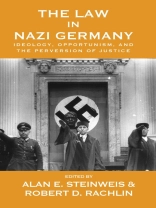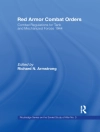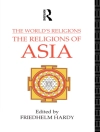While we often tend to think of the Third Reich as a zone of lawlessness, the Nazi dictatorship and its policies of persecution rested on a legal foundation set in place and maintained by judges, lawyers, and civil servants trained in the law. This volume offers a concise and compelling account of how these intelligent and welleducated legal professionals lent their skills and knowledge to a system of oppression and domination. The chapters address why German lawyers and jurists were attracted to Nazism; how their support of the regime resulted from a combination of ideological conviction, careerist opportunism, and legalistic selfdelusion; and whether they were held accountable for their Nazi-era actions after 1945. This book also examines the experiences of Jewish lawyers who fell victim to anti-Semitic measures. The volume will appeal to scholars, students, and other readers with an interest in Nazi Germany, the Holocaust, and the history of jurisprudence.
Jadual kandungan
Preface
List of Illustrations
Introduction: The Law in Nazi Germany and the Holocaust
Alan E. Steinweis and Robert D. Rachlin
Chapter 1. The Conundrum of Complicity: German Professionals and the Final Solution
Konrad H. Jarausch
Chapter 2. Civil Service Lawyers and the Holocaust: The Case of Wilhelm Stuckart
Hans-Christian Jasch
Chapter 3. Roland Freisler and the Volksgerichtshof: The Court as an Instrument of Terror
Robert D. Rachlin
Chapter 4. Guilt, Shame, Anger, Indignation: Nazi Law and Nazi Morals
Raphael Gross
Chapter 5. Discrimination, Degradation, Defiance: Jewish Lawyers under Nazism
Douglas G. Morris
Chapter 6. Evading Responsibility for Crimes against Humanity: Murderous Lawyers at Nuremberg
Harry Reicher
Chapter 7. Judging German Judges in the Third Reich: Excusing and Confronting the Past
Kenneth F. Ledford
Appendices
Contributors
Select Bibliography
Index
Mengenai Pengarang
Robert D. Rachlin is Senior Director and General Counsel of Downs Rachlin Martin PLLC, in Burlington, Vermont. He is also a visiting professor at the Vermont Law School and adjunct faculty in the Carolyn and Leonard Miller Center for Holocaust Studies and the Department of German and Russian, University of Vermont. He has published on the Finnish response to the Holocaust, Nazi-era law in Germany, early Vermont history, and American law.












